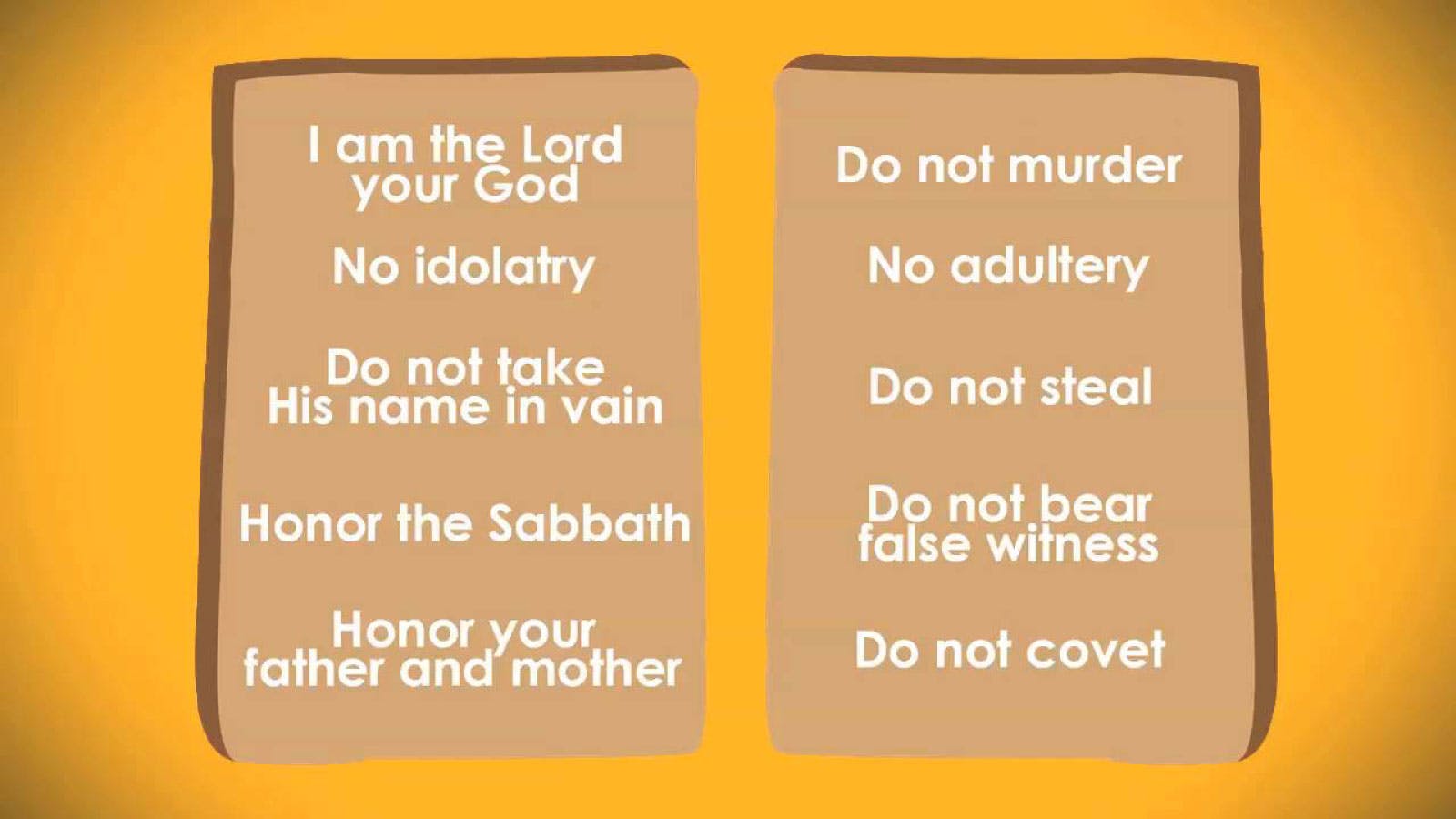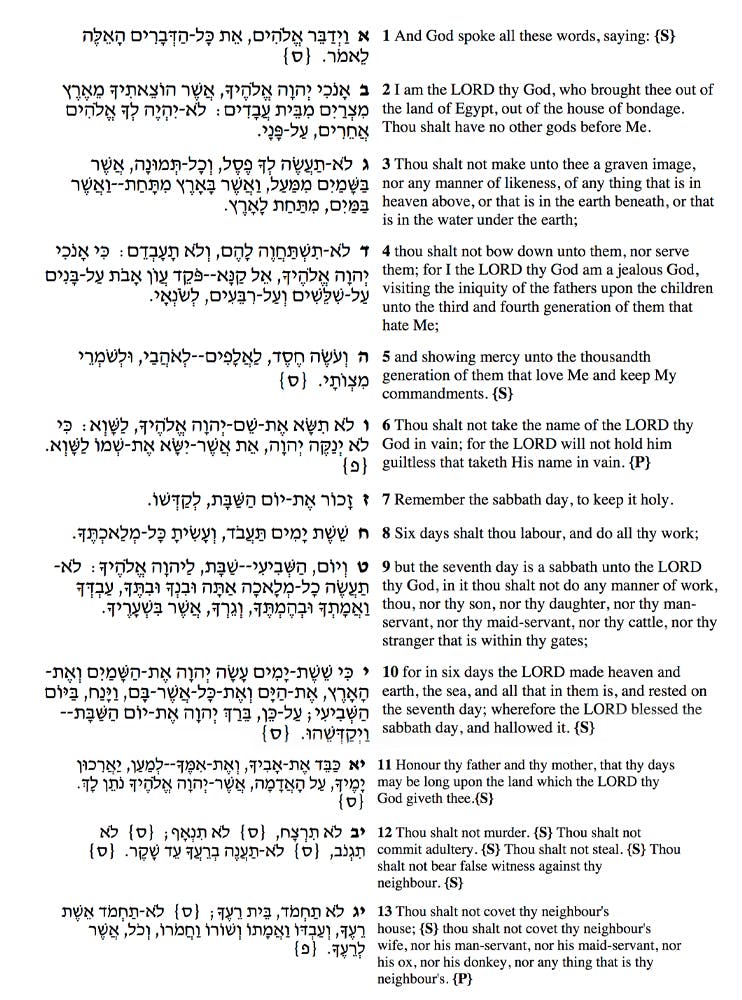The Ten Commandments Explained
10 commandments vs 613 commandments
Throughout Jewish history, the Ten Commandments have represented the moral essence and spiritual code of the Torah. But how can just a handful of biblical verses contain so much meaning? What do the Ten Commandments really teach us, and how do they apply in today's world?
The Ten Commandments In Judaism
613 Commandments vs The 10 Commandments
One of the most iconic Biblical images is the Ten Commandments, etched in stone on two tablets and held high above the head of Moses.
Though the Bible actually has 613 commandments, the Ten Commandments (עשרת הדברות), also known as the Decalogue or the Aseret HaDibrot (Ten Sayings) in Hebrew, have always held a unique place in Jewish practice. The Torah tells us that God gave the Ten Commandments to the Israelite nation when they gathered at Mount Sinai to receive the Torah, an event we commemorate on Shavuot.
Some of us look to the Ten Commandments as a summary of Biblical theology and ethics, even viewing the commandments as a Table of Contents for the rest of the mitzvot. Rabbi Fohrman explores this concept by dissecting the layers of meaning hidden in the structure of the Ten Commandments, and uncovers some core principles for the Torah’s many lessons. The structure of the Tablets is designed to convey a deeper meaning about the fundamental values of the Torah than the content of the Ten Commandments communicates alone.
The 10 Commandments Meaning Explained

The Ten Commandments In The Torah
The Ten Commandments are found twice in the Torah, first in Exodus 20:1–14, and again in Deuteronomy 5:6–18.
God's 10 Commandments in Exodus
The book of Exodus centers on the story of the Israelite people’s slavery in, and exodus from, Egypt. One of the most important episodes in this story is the receiving of the Torah at Mount Sinai, or Har Sinai in Hebrew, seven weeks after the Exodus from Egypt, marked today by the holiday of Shavuot.
The narrative of this experience begins in Chapter 19 of Exodus. There we learn that, in the third month of wandering in the desert, the Israelite people came to Har Sinai. After three days of preparation, God revealed Himself to the people amidst “thunder, and lightning, and a dense cloud upon the mountain, and a very loud blast of the horn” (19:16). God then spoke to the nation, beginning His revelation with the Ten Commandments.
Soon after, Moses ascended Mount Sinai to receive two stone tablets upon which the Ten Commandments were “inscribed with the finger of God” (31:18). These tablets were infamously broken by Moses upon his descent, when he came upon the Israelite nation worshipping the Golden Calf.
Moses then ascended Har Sinai again to receive the second set of tablets, but this time, God only dictated to Moses, and Moses wrote the Ten Commandments down himself (34:28).
Moses & The 10 Commandments In Deuteronomy
The Book of Deuteronomy finds the people preparing for their entrance into the Land of Israel. At this time, Moses recounts for the Israelite nation the experience of Matan Torah, the receiving of the Torah, including a reiteration of the Ten Commandments. After 40 years of wandering in the desert, the generation that had been there when God recited the Ten Commandments at Har Sinai had predominantly died out. Moses’s sermon, therefore, served to inspire a new generation of Israelites and reinforce the importance of the Ten Commandments and God’s revelation at Sinai.
The Burning Bush: A Foreshadow Of The 10 Commandments?
In addition to the above sources, the Torah also foreshadows the giving of the Ten Commandments in the narrative of the miraculous burning bush (3:1–4:17), where God first revealed Himself to Moses. If we look closely at the dialogue between God and Moses at the burning bush, we can see numerous parallels between God’s five statements there and the first five of the Ten Commandments. (Another connection is the location itself – the burning bush conversation took place at Mount Sinai, where we ultimately received the Ten Commandments.)
In essence, the smaller event between Moses and God at the burning bush is “doubled” when God reveals himself to the entire Israelite nation and gives them ten, not just five, commandments. What can we draw from these parallels? Rabbi Fohrman searches for meaningful answers in his exploration of the connections between the burning bush and Ten Commandments.
What Are The Ten Commandments: All 10 Commandments Explained
First Commandment: "I am the LORD your God who brought you out of the land of Egypt, from the house of slavery."
The first of the Ten Commandments is also probably the most controversial. It would seem that the commandment is simply to believe in God, but are our beliefs really something we have control over? Furthermore, the premise is odd. If I do not believe in God, I don’t care what the Ten Commandments has to say, do I? In other words, if belief in God is a prerequisite for accepting the Ten Commandments, how can it be a commandment itself?
While this is a matter of extensive debate among scholars, one possible answer lies in the above interpretation of the first commandment. The commandment is not just about believing in God as a statement of reality, but about recognizing God; that is, the first of the commandments remind us to accept God into our lives and build a relationship with Him even when that is difficult to do.
Second Commandment: “You shall have no other gods before Me.”
Idolatry suggests a metaphysical economy where lots of different gods provide human beings with lots of different services in exchange for their worship. If one god doesn’t give me what I want, I’ll just go to a different one.
But if we, the readers and believers of the Torah, have only one God, then we must understand that everything, good and bad, comes from Him, and we must contend with this reality rather than run from it.
Therefore, the second of the ten commandments, the prohibition against idolatry, is fundamental to Jewish thought. Of course, other “gods” are not a threat to God’s authority. As with the first commandment, the key to understanding this commandment is looking through the prism of building a relationship with God. We work on our relationship with God by staying loyal and committed to Him, and not searching for other outlets, even when He isn’t giving us what we want.
Third Commandment: “Do not take the name of the Lord, your God, in vain.”
Because God does not have a physical presence, His name is, in a sense, His embodiment. We reference and identify God through His name (“Hashem,” as many Jews colloquially refer to God, literally translates as “the name.”). For this reason, God’s name holds a special status in Judaism, and the most holy forms of His name must be treated with extreme reverence. To take God’s name in vain would be equivalent to tainting or violating His identity.
Fourth Commandment: “Remember the Sabbath day, to keep it holy.”
The Sabbath commemorates God's rest on the seventh day of creation.The fourth commandment obligates us to rest on the Sabbath, just like God did, and to sanctify the day with special prayers and rituals. We do this each week to acknowledge that God created the world and to recommit ourselves to the consequences of this truth.
Join Rabbi Fohrman as he introduces the concept of "rest" on Shabbat in the 21st century, and discusses the fundamental question of why Shabbat is even more important in today’s hurried world.
Fifth Commandment: “Honor your father and mother.”
The commandment to honor your father and mother seems to disrupt what would otherwise be a perfect split in the Ten Commandments between commandments about our relationship with God and our relationships with other people. Many scholars attempt to explain this apparent lopsidedness by pointing out the parallels between our relationship with God and our parents: both God and our parents are partners in our creation, thus, it is fitting that the commandment regarding parents is included in the “God commandments” section.
Furthermore, both one’s relationship with God and one’s relationship with his parents are “non-equal.” There is an inherent hierarchy between parents and children, and between God and His creations. If we consider these angles, the pattern of the Ten Commandments is not disrupted at all. The first five commandments are about our relationships with higher powers, while the second five commandments involve our relationships with equals–in other words, vertical and horizontal relationships.
Sixth Commandment: “You shall not murder.”
The prohibition of murder reflects the inherent value and dignity of every person as a being created in the image of God.
Seventh Commandment: “You shall not commit adultery.”
Echoing the theme of the prohibition of idolatry, adultery brings a foreign entity into a marriage that can hurt the relationship.
Eighth Commandment: “Do not steal.”
To steal from another person is a violation and disregard of the boundaries that exist between you. Both self-respect and respect for others hinge upon our ability to recognize what is our own and what belongs to another.
Ninth Commandment: “Do not bear false witness against your fellow.”
The ninth of the Ten Commandments safeguards the importance of maintaining a just and honest society. False words can destroy a person’s reputation in an instant, and so we all must be careful not to abuse the power of speech.
Tenth Commandment: “Do not covet.”
Desiring what is not yours, even without acting upon it, is a larger infraction than it may seem. The Tenth Commandment warns us not to fall into the trap of believing everyone else has it better than you. If God created each person as a unique individual, then each of us are meant to live our life and no one else’s. To do that means accepting ourselves, our blessings and our misfortunes, and not desire what someone else has.
The 10 Commandments In The Bible Text
The Commandments In Hebrew & English

The Commandments In Hebrew & English
